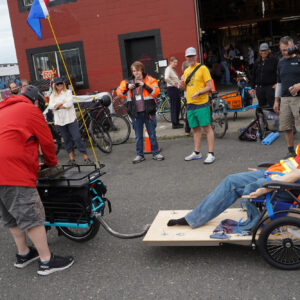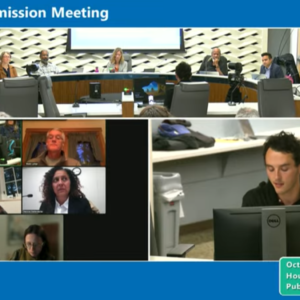The longer I document bike culture, the more I realize just how much a bike and a motivated rider can do together. Just when I feel like I’ve seen it all, I am once again inspired and amazed.
This phenomenon came into play once again at the 10th annual Disaster Relief Trials, which were held Saturday at Cully Park in Northeast Portland.
The idea that bicycles can play a big role after a big disaster strikes has gone from the fringe to the mainstream in the past decade or so and this event is a big reason why. Organizers set up a mock re-supply run set four days after a disaster. There were a series of checkpoints and challenges each of the 30 or so competitors had to deal with. Among the tasks needed to finish were navigational skills, loading awkward objects, and lifting their bicycle (and trailer) over a park bench.
And while we say “cargo bikes,” there really is no limit to what type of vehicle can be used in the DRT — as long as it’s not a gas-powered one. We’ve seen someone complete the course on a skateboard in year’s past. And this year Ryan Hashagen did the course on roller skates while pushing a grocery cart!
In our video of this year’s event, you’ll see how it all went down. Amit Zinman captured some great shots of the bikes, the people, and a lot of the action out on the course.
Thank you to our advertisers and subscribers. Their support makes content like this possible! Please consider joining them today.







Thanks for reading.
BikePortland has served this community with independent community journalism since 2005. We rely on subscriptions from readers like you to survive. Your financial support is vital in keeping this valuable resource alive and well.
Please subscribe today to strengthen and expand our work.
Great video!!!! I love the energy it gives.
Weird. Does anyone really believe that cargo bikes, guys on roller skates pushing grocery carts, skateboarders, are going to save the day when The Big One hits? Or am I missing one helluva spoof?
I do.
Me too. Downed trees, major repaving projects—the only person who can get through is my husband on his bike. Or people on foot.
They aren’t going function as a major response force to people who can’t help themselves, but they will provide many households with mobility and self-reliance. Fossil fuels will be gone within days, and electrical charging will only be possible if you have an isolated PV system.
Mike Quigley,
Using a bike to move wood/food/medicine/water after the big earthquake will probably not work a smoothly or easily as it did in this exercise.
It doesn’t have to.
A person with a bicycle and a bike trailer can move significantly more stuff, more efficiently than a single person without a bike can *even if that person has to walk the bicycle* (almost like a cart). ANYTHING that will help material move after the big earthquake is going to be important and helpful.
Are people with bikes/cargo bikes the ONLY thing that will help? the only solution? No. And the Disaster Relief Trials doesn’t claim that they are the only solution.
Are people with bike/cargo bikes going provide very valuable assistance moving material (and thus saving lives) after the big earthquake? Absolutely!
Furthermore, getting people engaged in disaster response BEFORE a disaster is important. Creating an event where people can engage with a very scary topic in a way that helps them feel a little less overwhelmed has a huge benefit! I joined the Portland NET (Neighborhood Response Team) program AFTER my first DRT because it engaged me in a way that nothing else had up to that point.
When the big one hits, ALL of us will become responders. Every person in Portland and the surrounding area. Every. Single. One.
This is just one way to prepare. It’s ok that it’s not your way to prepare. That doesn’t make it less valuable.
Thank you Mike Cobb for this great event!
95% of major disaster victims are rescued and assisted by non-professionals. We have a 1:45 ratio of pro first responders to citizens in PDX. 9.0 Cascadia Subduction Zone rip = all hands on deck. Automobiles will be largely useless. First responders will be swamped. Not everybody who needs help will get help, cargo bike supply runs or not.